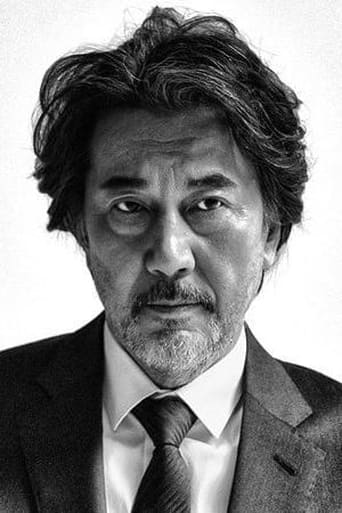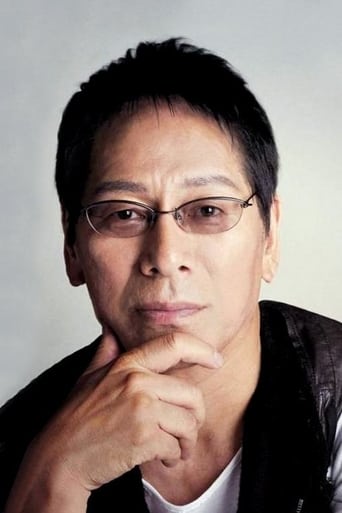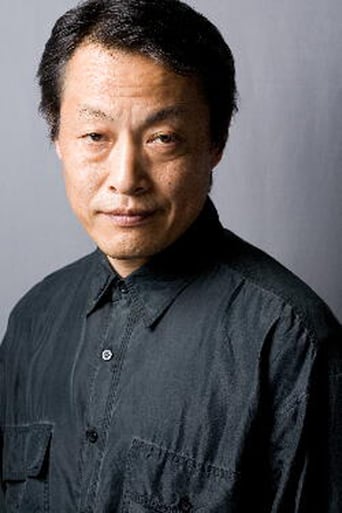GamerTab
That was an excellent one.
Greenes
Please don't spend money on this.
Ogosmith
Each character in this movie — down to the smallest one — is an individual rather than a type, prone to spontaneous changes of mood and sometimes amusing outbursts of pettiness or ill humor.
Mandeep Tyson
The acting in this movie is really good.
f231843
The consensus on this film seems to be an exploration of the dichotomy between individualism and society, but given the director's own statements about the origins of the film and his own uncertainty about the ultimate meaning, I think this film is still up for interpretation and some healthy debate, 14 years later. ^.^ The ending of this film does not match the interpretation that ebossert below describes. If the collapse of society were due to Yabuike's rejection of the dichotomy, this would be a wrong ending. It creates another dichotomy, and actively goes against the film's own stated philosophy: that the destruction, rather than preservation, of both would lead to chaos/extinction. The chaos seen at the end of the film is something different. What is being contrasted in this film is not society with individualism, but society with an individual. Just as it's insane to allow a destructive individual to continue to exist and taint a society for his uniqueness, it's also excessive to kill that person to protect society. There has to be a way to save both--that's Yabuike's plan. The non-linearity and philosophy seen in this film (and countless other Japanese films) draws, through perhaps unconscious cultural channels, from Buddhism. Particularly in Zen Buddhism, the form most popular in Japan, all is changing and inseparable. There is no individual, for we are all intricately and inextricably bound by forces tying us together--cause and effect. The solution to the problem, then, is not to kill the individual to protect society, as the botanist wishes, nor to let the forest be killed to protect the tree, as Kiriyama wishes. Yabuike's solution is chance. Pure, random, chaotic chance. Since all are equal, kill this one, let this one survive. This explains the men in black (who may represent the forces of nature), who simultaneously break away from the false paradigm with Yabuike. They throw away their caps, lifting the mental ceiling off, and he no longer has any qualms about risking one person's life to save another in a hostage situation. The ending is a bit dramatic for an otherwise deliberately-paced film; more accurate would have been a subtle, understated change in society, but that's difficult to depict when your film is already 100 minutes long. In short, Kurosawa Kiyoshi created with this another excellent film that watches like a good book reads. I had to take several pauses to reflect on the ideas and parallels depicted on screen. If you're reading this now, chances are you're just discovering Kurosawa as I did years ago. He is now my favourite director, and Yakusho Kouji my favourite actor. I highly recommend watching, and rewatching, both of their films!
Etsuko S. Kemble
Karisma (Charisma) directed by Kiyoshi KurosawaThe thing 'Karisma (Charisma)' impressed me the most is how the director Kiyoshi Kurosawa delivered this psychological/philosophical story with a calculated manner. When Goro Yabuike, a detective from Tokyo, lost his way in an isolated and peculiar community in a countryside, he started getting involved with different groups of people who were disputing over this one tree they called 'Karisma (Charisma).' The tree was imported from outside of the country by the director of the asylum who passed away, and later the community learned that the tree was actually poisoning all other trees and grass around it for its solo survival. They argued whether they should protect the tree, which was destroying the woods, or they should get rid of the poisonous tree to save the woods. The 'Karisma' tree becomes a medium of their communication, and Yabuike, the outsider, suddenly got a position to play the God to make the decision. Kiyoshi Kurosawa is trying to show a conception of nature in the film. The answer the detective Yabuike suggests is that the chaos over the 'Karisma' is based on human's selfish interest and not the natural order. The director Kiyoshi Kurosawa mathematically composed "the rule of a game" in a fictional story setting. 'Karisma (Charisma)' is a very interesting psychological and philosophical film.
Pedro-37
Kiyoshi Kurosawa is one of the most amazing stylists around. I loved his "Cure" for its distanced, analytical camera work - but I'm no fan of that movie's ending. Then I've seen "Kaïro" and was amazed because it had a completely different style. Scary and finally apocalyptic in a way I've never thought it would go. "Charisma" is the third Kurosawa-movie I've seen and again, its style is amazing. Sometimes the camera watches a scene from far away and gives the action a distanced, neutral look. The shots in the forest are amazing. Sometimes green and lush, sometimes misty and foreboding.But what about that story? I've read many interpretations - that this is an analysis of Japan's society, that this is a neutral (which would fit the style) look at a confrontation of "wrong" and "right". Well, that's all rather intriguing - but no, it doesn't satisfy me at all. Now that I think about it, I'm actually very disappointed by the story. No one in this movie acts rationally which lifts the movie away from reality and lessens its social commentary. It had flashes of brilliance where I clearly saw what Kurosawa was aiming at - but he could not sustain his ideas for the full running time. Sometimes I thought this was a parody and all Kurosawa wants to do in the end is laugh at the viewer who was expecting something that makes sense.That said, I have to admit that it gives you a lot of thought fodder - just not in any rewarding way. Even if it is a clever commentary on Japan's society, that would not be enough for almost 2 hours. So the only really great thing about this film is its visual glory. I'm still not sure whether I like Kurosawa's movies or not. I certainly won't forget them.
Rating: 6/10
rag-9
Although Charisma was not my favourite movie at the Rotterdam filmfestival, I liked this new movie from Kurosawa Kiyoshi, because of it's neutral message. It shows various sides of the same story without ever judging. It's up to the viewer to decide what he/she gets out of it. At the same it's never really clear what the plot's about. There are some opinions (battle, nature vs man), but i believe there were several. And again, the viewer can pick up what moved him/her watching this film. To me that is a true accomplishment.





